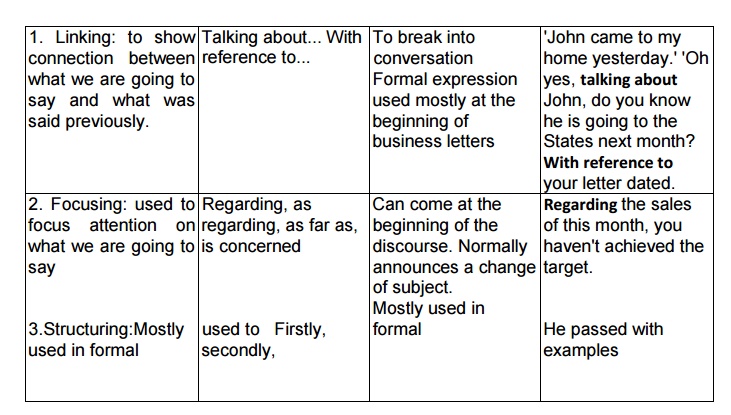Chapter: English
Connectives (Discourse Markers)
CONNECTIVES (Discourse Markers)
Sentence
coherence is integral to sentence effectiveness. Appropriate connectives should
be used to connect words, phrases and clauses in a sentence. In order to
achieve coherence, technical writers and speakers use several linking devices
or connectives. There are two types of linking devices, overt and covert. Overt
devices are direct and explicitly stated while covert devices are indirect and
implicit. Covert devices include techniques such as repetition of the key word,
the use of articles (a, an, the), pronominal forms (he,she, it, they, and so
on), and the use of synonyms. However, technical communication largely uses
overt linking devices or connectives to indicate the logical progression of
ideas in oral discourse or writing.
Following
are some examples, in which connectives (bolded) have been used:
When an object
is placed on one side or the other of a converging lens and beyond the focal plane, an image is formed on the opposite
side.
If the
object is moved closer to the primary focal plane, the image will be formed farther away from the secondary focal
plane and will be larger.
Land pollution is due to solid wasters.
Fresh water is a renewable source, but its distribution is uneven.
Asbestosis is caused
by asbestos, which is used in
making ceilings.
These
connectives include subordinators and coordinators. They can also be classified
according to their functions. The following table presents the usage of
discourse markers:

![]()
![]()
I. Read
the following paragraphs and fill in the blanks with appropriate connectives.
I. When Hydrogen gas escapes from a
cylinder into the air, no change is visible.
However, if the escaping hydrogen is directed at
finely divided platinum, it is observed that
the platinum glows and soon
ignites the hydrogen. In the absence of platinum the H2O2 reaction is too slow to observe. In
contact with platinum, hydrogen reacts with oxygen from the air to form water. As they react, the give off energy, which heats the platinum.
As the platinum gets hotter, it
heats the hydrogen and hydrogen with oxygen becomes self-sustaining.
II. Join the
following pairs of sentences, using the discourse markers given in the brackets
against each pair.
1. My
father earns plenty of money. He hates spending money on luxurious living.
(inspiteof)
In spite of earning plenty of money, my father
hates spending money on luxurious living.
I switch off the fridge at night. It saves money.
(to) I switch off the fridge at night to
save money.
Asma's suitcase was lost in the transit. She got it
back. (however) Asma's suitcase was lost
in the transit however she got it
back.
Water could not be supplied by a centralized
system. The cost of this would be very high. (because)
Water could not be supplied by a centralized system
because the cost of this would be very high.
India Mark II has built-in mechanical efficiency.
Even children can operate it easily. (so
that)
India Mark II has built-in mechanical efficiency so
that even children can operate it easily.
Gold is malleable. We can change its shape by
pressing and hammering. (therefore)
Gold is malleable therefore we can change its shape
by pressing and hammering.
Petrol has become expensive. Many people prefer to
use cheaper forms of transport. (as)
As petrol becomes expensive, many people prefer to
use cheaper forms of transport.
Oil is struck in the rock layers. Production wells
can be drilled to extract oil. (if) If oil is struck in the rock layers,
production wells can be drilled to extract oil.
III. Join the following pairs of sentences by using
appropriate connectives
The maid must be very tired. She had worked the
whole day.
The maid must be very tired because she had worked
the whole day.
I may help you. I may not help you. You are sure to
lose the contract.
I may help you but I may not help you because you
are sure to lose the contract.
He said something. I did not hear it.
He said something but I did not hear it.
The robbery was committed last Tuesday. The man has
been caught. Since the man has been caught, the robbery was committed last
Tuesday.
He is illiterate. His parents are illiterate as
well.
He and his parents are illiterate.
He has come here. He will see you.
He has come here to see you.
I could not attend the meeting. I was ill.
As I was ill, I could not attend the meeting.
She is a painter. She is a poet.
She is painter and a poet.
Related Topics